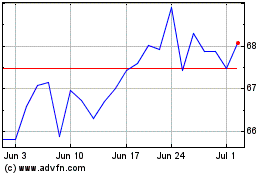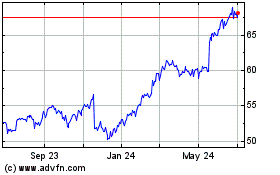By Sarah Nassauer and Anne Steele
Wal-Mart Stores Inc. and Home Depot Inc. on Tuesday showed they
can still find ways to entice shoppers to their physical stores,
despite a continuing consumer shift toward online buying.
Both big box retailers reported strong sales over the holiday
season, unlike other brick-and-mortar competitors such as Target
Corp. and Macy's Inc., showing that some retailers are managing to
capitalize on a strengthening economy.
Wal-Mart said more shoppers came to its stores and spent more
when they did, as the company invested heavily to lower prices and
improve customer service. "Versus two years ago, our stores are in
better shape than they were and you're seeing the results of that,"
said Wal-Mart's chief financial officer, Brett Biggs, in an
interview.
On Tuesday, the world's biggest retailer reported that sales in
U.S. stores open at least 12 months rose 1.8% in the quarter ended
Jan. 31, the 10th consecutive quarter of gains. But the strength of
the company's U.S. store business continues to come at the expense
of profits, which fell 18% in the quarter. The retail behemoth is
investing billions to raise U.S. store worker wages, lower prices
and expand e-commerce sales to better compete with Amazon.com
Inc.
Home Depot's same-store sales rose 5.8% in the fourth quarter,
driven by a strong housing market that prompted customers to start
bigger home-improvement projects and replenish their toolboxes.
U.S. home values have recouped all of the losses of the recent
housing bust, in September eclipsing a record set in July 2006,
according to data from S&P CoreLogic S&P Indices.
The retailer also pointed out that while its online sales are
growing, nearly half of those orders were fulfilled through
in-store pickup. "While we are seeing significant growth in our
online business, our stores have never been more relevant," Home
Depot's chief executive, Craig Menear, said during a call with
analysts.
Wal-Mart and Home Depot's performance contrasts with many other
brick-and-mortar retailers, which are challenged by shoppers
gravitating to less-profitable online shopping and discounters
offering low prices.
Macy's longtime Chief Executive Terry Lundgren said Tuesday that
record U.S. car sales indicate consumers have spent a bigger
portion of their budget on big-ticket items lately. "At some point
in time you've got to believe that everybody's going to have a
brand-new car," Mr. Lundgren said, after the department store chain
reported its eighth straight quarter of falling comparable-store
sales. "There's dollars that are going to be freed up for other
categories of spending."
Investors have become wary of the retail market after Target,
Macy's and Kohl's Corp. reported weak holiday sales. Warren
Buffett's Berkshire Hathaway Inc. dumped $900 million worth of
Wal-Mart shares at the end of 2016, nearly exiting the stock,
according to federal filings.
In 2016, while retail sales rose across the board, online
retailers took much of the spoils. During the year, spending rose
11% at online retailers and fell almost 6% at department stores,
according to Commerce Department figures.
Macy's, which is closing stores and laying off thousands of
staffers, on Tuesday reported a 2.1% drop in comparable-store sales
in the latest quarter. Its profit fell 13%. Macy's said it raised
$673 million from selling real estate and would continue to explore
options for its properties.
The retailer on Tuesday said its problems could be fixed, even
as shoppers increasingly do their purchasing online.
"There's lots of concern out there with our ability to bounce
back, but internally we've got a lot people on our team who have
seen this movie or some version of it," Mr. Lundgren said on a
conference call. Although he will step aside as CEO next month, he
said Macy's "made strategic decisions in 2016 that will carry us
through."
Wal-Mart's sales grew in most of its categories, particularly
clothes and health products. Revenue rose 1% to $130.9 billion, and
excluding currency swings, it said revenue would have climbed to
$133.6 billion.
The company has worked to strengthen its e-commerce
capabilities, purchasing Jet.com Inc. for $3.3 billion last
September. Online sales, however, grew more slowly in the fourth
quarter after a previous quarter of acceleration, rising 16% in its
first full quarter that included Jet.com sales, compared with a 21%
uptick the previous quarter. That quarter included some sales from
Yihaodian, the Chinese online retailer Wal-Mart sold last June,
said a spokesman.
Overall for the period that ended in January, Wal-Mart reported
a profit of $3.76 billion, or $1.22 a share, down from $4.57
billion, or $1.43 a share, in the year-earlier quarter.
Wal-Mart executives said that the first quarter of fiscal year
2018 has thus far been "soft," in part because the government has
worked to prevent fraud by delaying tens of billions in early tax
refunds that often go to low- and middle-income shoppers,
Wal-Mart's core consumer.
"Nothing has markedly changed about the consumer overall," said
Mr. Biggs. In past years the Internal Revenue Service delayed a
smaller number of refunds and spending was pushed into the
following quarter, he said.
In a research note, the Buckingham Research Group called
Wal-Mart's sales figures strong, "but the question that remains
unanswered in our minds is when can sales growth overcome
investment spending and translate into earnings growth?"
--Joshua Jamerson contributed to this article.
Write to Sarah Nassauer at sarah.nassauer@wsj.com and Anne
Steele at Anne.Steele@wsj.com
(END) Dow Jones Newswires
February 21, 2017 16:57 ET (21:57 GMT)
Copyright (c) 2017 Dow Jones & Company, Inc.
Walmart (NYSE:WMT)
Historical Stock Chart
From Mar 2024 to Apr 2024

Walmart (NYSE:WMT)
Historical Stock Chart
From Apr 2023 to Apr 2024
